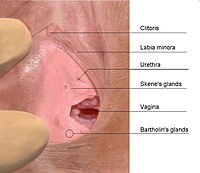
Photo from wikipedia
Watermelon is one of the most desirable vegetable crops in the world. Recently, grafting is common in watermelons worldwide, but not all grafting methods are compatible with polyploids. In this… Click to show full abstract
Watermelon is one of the most desirable vegetable crops in the world. Recently, grafting is common in watermelons worldwide, but not all grafting methods are compatible with polyploids. In this study, diploid, triploid, and tetraploid from one watermelon variety, “Mi Mei”, were grafted on the “Xijiaqiangsheng” squash rootstock to study the effect of genome duplication on graft compatibility. Three grafting methods (splice, hole, and tongue) were used to determine graft compatibility. Significant differences in survival rates, hormones, antioxidants (AOX), sugars, and starch contents were observed between compatible/incompatible combinations. Compatible combinations with high survival rates showed high levels of hormones, AOX, carbohydrates, and low hydrogen peroxide H2O2 compared to incompatible plants. The hole grafting method was more efficient with diploid, while splice was efficient with a tetraploid, and both methods can be used for triploid. Compatibility is a combined effect of hormone, carbohydrate, and antioxidant activities. We predict that compatibility is a complex process and that further molecular studies must be performed to dig deep into this phenomenon.
Journal Title: Agronomy
Year Published: 2021
Link to full text (if available)
Share on Social Media: Sign Up to like & get
recommendations!